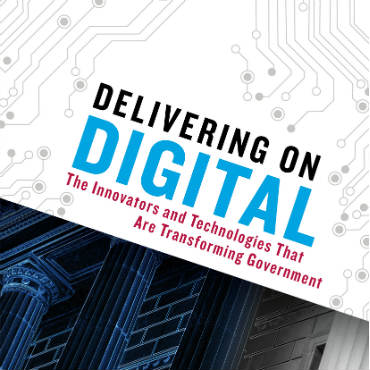Getting government to go digital
William D. Eggers details the necessary steps for applying new technologies to today's government. PLUS: Three more books IT leaders should be reading.

Today's government agencies have access to technological tools that increase efficiency, reduce IT maintenance costs and simply make life easier.
So why, William D. Eggers asks, do so many interactions with government in 2016 feel like something out of the 1980s? "We get agitated when Instagram takes two seconds longer than usual to load," he said, "but still consider it normal to wait two hours to get a driver's license."
Government IT is not a new subject for Eggers. He has written about e-government and dug deeply into "governing by network," public-sector innovation and the unique challenges of driving change at government scale. In "Delivering on Digital: The Innovators and Technologies That Are Transforming Government," Eggers — who is director of public-sector research at Deloitte — applies his decades of government reform experience to sketch a detailed vision of what a digital government might look like, how attainable it is and, most important, how we can overcome obstacles to get there.
Eggers posits that the problem is not rooted in technological shortcomings but rather in cultural resistance and a tendency to fall back on traditional ways of doing things — even at the expense of the user experience, efficiency and cost-cutting.
He argues that HealthCare.gov was a tipping point that proved just how necessary digital superiority has become. "The public failure reprioritized digital government in a way that neither appointment, nor report, nor congressional testimony ever could," he writes.
As his focus broadens to the rest of the government, he asks the daunting, multibillion-dollar question: "So how do you take a government built on analog, industrial-era frameworks and redesign it as a fully digital state?"
With the digital tools at our disposal, Eggers writes, "we must imagine a new kind of government."
Because doing that seems so overwhelming, Eggers eschews analytical pleas and technical jargon, and instead relies on relatable management techniques and abundant real-world success stories. He divides the challenge into five core themes critical to any digital operation:
- Openness/transparency
- User-focused design
- Engagement with users during creation
- Simplicity
- Agility
The sort of disruption Eggers describes doesn't demand a complete overthrow of the government. Instead, it values starting small to tackle even the most onerous projects and entails thinking critically about users' needs before harmonizing business goals with available technologies — a concept that sounds simple, but Eggers contends it would revolutionize the way the government conducts business.
Delivering on digital also entails transitioning from waterfall to agile development processes. Eggers points to the modernization effort that Transport for London, one of the world's largest transit agencies, undertook in 2015 as a possible model. Alistair Montgomery, a TFL manager, initially opposed any change in the status quo but admitted he became "a complete convert" to the agile methodology in two weeks.
To enable skeptics like Montgomery to overcome concerns or misconceptions about technology, Eggers argues, nothing compares to seeing its efficacy firsthand. "Show, don't tell," as he puts it.
He also tries to dispel the myth that technology can trump everything else in developing a digital government.
"A growing cadre of digital innovators is as indispensable to achieving government's digital future as are the technologies that enable it," Eggers writes. He argues that a commitment to technology and the built-in allure of "making a difference" through government work will attract a tech-savvy workforce, at least for a few years at a time. The technology, in other words, is simply a means to an end.
Ultimately, the central theme Eggers seeks to impart is the importance of tackling new ways of thinking and not fearing the inevitable expansion of technology. Transforming government is serious business, and "Delivering on Digital" provides a well-informed outline for ushering in the government's digital age.
NEXT STORY: When data deceives






